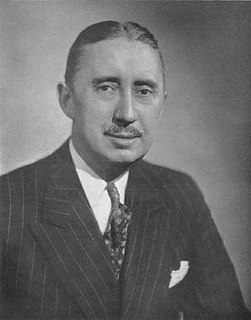A Quote by Theodosius Dobzhansky
The more we know, the better we realize that our knowledge is a little island in the midst of an ocean of ignorance.
Related Quotes
We have heard of a Society for the Diffusion of Useful Knowledge. It is said that knowledge is power, and the like. Methinks there is equal need of a Society for the Diffusion of Useful Ignorance, what we will call Beautiful Knowledge, a knowledge useful in a higher sense: for what is most of our boasted so-called knowledge but a conceit that we know something, which robs us of the advantage of our actual ignorance? What we call knowledge is often our positive ignorance; ignorance our negative knowledge.
Faced with the immensity of the universe, Job realized that there are limits to man's rationalizing, that we cannot find where the cloud of sorrow starts, that all our boasted knowledge is but an island in the vast ocean of mystery, and as the island of knowledge grows larger, the shore line of mystery becomes longer. At the end of his wits, he surrendered in trust to a Higher Wisdom.
To know how little one knows is to have genuine knowledge. Not to know how little one knows is to be deluded. Only those who know when they are deluded can free themselves from such delusion. The intelligent people are not deluded, because they know and accept their ignorance as ignorance, and thereby have genuine knowledge.
Suppose that we are wise enough to learn and know - and yet not wise enough to control our learning and knowledge, so that we use it to destroy ourselves? Even if that is so, knowledge remains better than ignorance. It is better to know - even if the knowledge endures only for the moment that comes before destruction - than to gain eternal life at the price of a dull and swinish lack of comprehension of a universe that swirls unseen before us in all its wonder. That was the choice of Achilles, and it is mine, too.
The Socratic maxim that the recognition of our ignorance is the beginning of wisdom has profound significance for our understanding of society. Most of the advantages of social life, especially in the more advanced forms that we call "civilization" rest on the fact that the individual benefits from more knowledge than he is aware of. It might be said that civilization begins when the individual in the pursuit of his ends can make use of more knowledge than he has himself acquired and when he can transcend the boundaries of his ignorance by profiting from knowledge he does not himself possess.
The endless cycle of idea and action, Endless invention, endless experiment, Brings knowledge of motion, but not of stillness; Knowledge of speech, but not of silence; Knowledge of words, and ignorance of the Word. All our knowledge brings us nearer to our ignorance, All our ignorance brings us nearer to death, But nearness to death no nearer to God. Where is the Life we have lost in living? Where is the wisdom we have lost in knowledge? Where is the knowledge we have lost in information? The cycles of Heaven in twenty centuries Bring us farther from God and nearer to the Dust.
Despite popular theories, I believe people fall in love based not on good looks or fate but on knowledge. Either they are amazed by something a beloved knows that they themselves do not know; or they discover a common rare knowledge; or they can supply knowledge to someone who's lacking. Hasn't everyone found a strange ignorance in someone beguiling? . . .Nowadays, trendy librarians, wanting to be important, say, Knowledge is power. I know better. Knowledge is love.
































